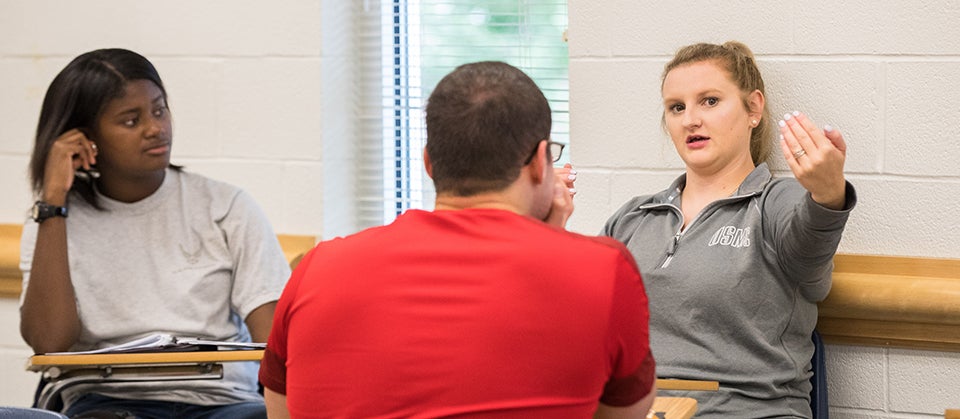New program supports student veterans
Successfully transitioning from the military to the university is the focus of a new grant-funded program for student veterans at East Carolina University.
Dr. Anna Froula, associate professor of film studies in the Department of English, designed a two-week Soldier to Scholar bridge program to bring together war scholars and student veterans who are beginning their studies at ECU this fall.
The work is funded by a two-year, National Endowment for the Humanities grant of almost $65,000.
In August, 12 student veterans met in a small group setting in the Belk Building to prepare for university classes and culture. They talked about their war experience through the study of humanities texts including World War I poetry and novels, films from World War II and the Iraq war and the soundtrack from “Hamilton: The Musical.”
Topics included memory and memorialization, gender and war, homecomings, military folklore and veterans’ narratives, and representations of veterans in popular culture.
“I feel a lot more confident about starting my college career,” said Thomas Pritchett, a U.S. Marine Corps veteran who is studying biology at ECU. A medic in the National Guard, he hopes to attend medical school one day.

Oliver Keyvien, at left, and Thomas Pritchett, student veterans at ECU, participate in the Soldier to Scholar bridge program.
Meeting other veterans at ECU is a good first step, said Oliver Keyvien, a planned history major and Marine veteran. “Getting your feet wet with introducing yourself to different people and opening those lines of communication will help me be more comfortable in the college environment,” he said.
Reading novels and poems introduces the students to course material and critical thinking skills to “start thinking about more things than just what’s on the surface,” said Jonathan Garfin, a Marine veteran planning to major in nursing.
Sean Hart, a planned security studies major and U.S. Army National Guard member, said he was drawn to ECU because of the size of the campus and the resources available to students, such as the writing center. It also is less expensive than some other schools, he said.
Navy reservist Dennis Dillon, who plans to major in human development and family science, said he is not getting full GI Bill coverage for his education, so cost is a factor in going back to school.
While going to class will take some adjustment, following a schedule is something veterans are used to. “We’re focused and task oriented,” said Nicholas Cain, a U.S. Navy veteran and planned psychology major.
Keyvien said he thought he “would be a lifer” when he first joined the military. “Everyone thought they would do 20 years,” he said. “In the military, everything is laid out for you. Your hands held until you hold someone else’s. Civilian life is harder.”
Froula said there will be five regular class meetings but the program will be more voluntary going forward. On Nov. 6, the student veterans will choose a film related to military service that they will introduce and moderate a discussion that will be a university passport event and open to all.
She hopes the students will join campus veterans’ organizations for added support. She also will be keeping up with each one on their academic progress and retention. “They know I’m there for them and my door is open to them,” Froula said.
Froula’s team includes fellow English department faculty members Dr. Andrea Kitta, associate professor of multicultural and transnational literature, and Zack Perkinson, a U.S. Army veteran and teaching instructor, Nicole Jablonski, assistant director of ECU’s Student Veteran Services, as well as Dr. Jonathan Vincent, assistant professor of English at Towson University.
“This class will provide incoming student veterans with an amazing opportunity to start their education at ECU in a supportive environment surrounded by their peers,” Jablonski said. “But, more importantly, it provides time to unpack their military experience in an accessible and supportive manner.”
Out of 73 proposals to the NEH’s Dialogues on the Experience of War program, 15 were funded including a second award of almost $98,000 to ECU that Froula worked on in July in Saipan with project director Dr. Jennifer McKinnon, associate professor of history in the maritime studies program, and Dr. Anne Ticknor, associate professor of literacy studies in the College of Education.
Both proposals, part of the NEH’s Standing Together: The Humanities and the Experience of War initiative, raise questions about civilian obligations to service personnel, the necessity of understanding veteran experiences, and wars and their aftermaths. The initiative stresses the importance of the humanities in working through the experience of war.
Froula’s research encompasses veterans’ stories and their representations in popular culture. Most recently, she co-edited a volume on television series about war. She is the granddaughter of a World War II veteran, the daughter of a Vietnam veteran, and the cousin of an Iraq War veteran. Since 2015, she has served as the faculty sponsor of ECU’s chapter of the Student Veterans of America – the Pirate Veterans Organization.
“As a citizen, I am concerned about how few public conversations we have about our veterans, the wars in which they fight and our responsibilities to them when they return,” Froula said. “I am excited to develop this program and to help facilitate a supportive learning cohort that will support each other and fellow veterans throughout their time at ECU.”
NEH reviewers of Froula’s proposal remarked on the potentially profound impact for participants and the suitability of ECU as a hosting university, given its ongoing support of student veterans through its Student Veterans Services office. Since launching the Standing Together initiative in 2014, the NEH has awarded more than $7.7 million for humanities projects that serve veterans and help them share their experiences.

From left, ECU student veterans Kadijah Gunter, Dennis Dillon and Mary Beth Suplee meet before the start of classes at ECU.
Taken from ECU News Services